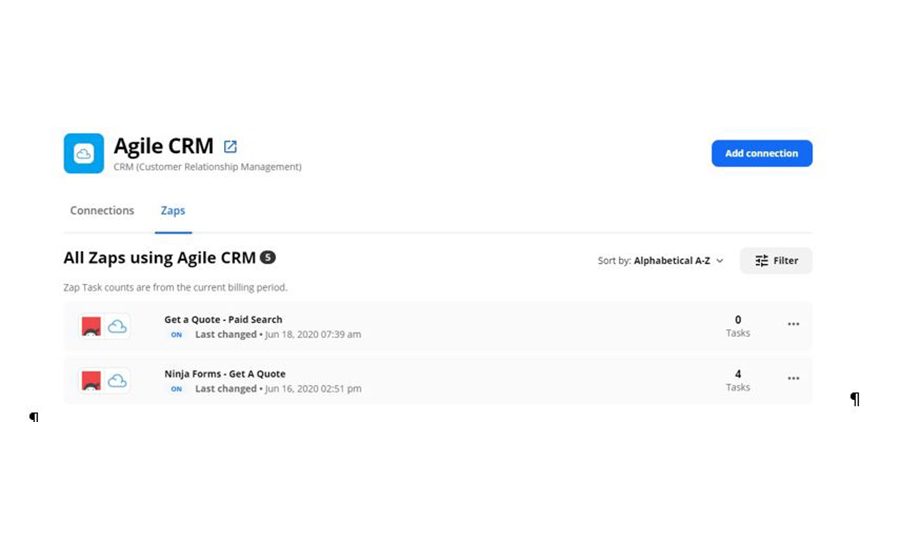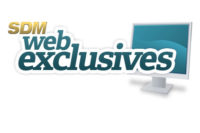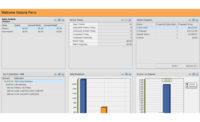USING THE RIGHT BUSINESS OPERATIONS SOFTWARE can yield big benefits for security dealers. SDM talked to six security dealers and integrators about this. Here’s what they told us.
Site Surveys Made Easier
Rochester, N.Y.-based dealer Securitronics has been using software from System Surveyor for five years to conduct site surveys and create presentations and drawings for clients.
“We use it whenever we do site surveys,” explains Terry Rivet, Securitronics president and CEO. “We ask for a floor plan … that we upload into System Surveyor and when the team goes out, they’re equipped with a mobile device [that runs the software].”
As the site is surveyed, Securitronics personnel can plot plans for the installation and take notes on the equipment they want to use.
“The client has a real good feel for what we’re trying to accomplish,” Rivet says.
Procedures sometimes have changed amid the COVID-19 pandemic, as travel has been limited. Rivet recently quoted a job in a distant state without visiting the client, with the help of the System Surveyor software. He sent a subcontractor who had never used the software to survey the site.
“I walked him through the basics of that software in less than an hour and [during the survey] he never had one question about how to use the software,” Rivet says. “I was online with him all the time and expected him to be there seven to eight hours, but we were on for four.”
Companies such as Zapier make it easier for dealers to do DIY software integrations. This screenshot shows a Zapier connection from Cornerstone’s web form to the company’s Agile CRM software.
IMAGE COURTESY OF CORNERSTONE
A New Development in Software Integration
The ability to integrate different software programs is important for business operations software for security dealers, who may want central station automation, billing, sales prospecting, field technician or other software to interoperate seamlessly.
Some software providers make agreements with one another to do these integrations, while in other cases that responsibility falls on the dealer. A new development in this area may simplify this process.
Scott McDougal, president of Fox Lake, Ill.-based Cornerstone Billing, is enthusiastic about new tools that have become available to simplify do-it-yourself (DIY) integrations. Companies such as Integromat and Zapier offer software tools that provide linkages between platforms, McDougal explains. A dealer can use the software tools, for example, to push a lead from a form on the dealer’s website to the dealer’s customer management system, eliminating the need to hire a coder to set that up.
“You can use best-of-breed software and service packages without having to tie everything together,” McDougal observes.
Dealers typically pay for this capability on a per-transaction basis, but, “It’s pennies,” McDougal says.
Bringing Consistency to Sales Quotations
Kent, Ohio-based Sage Integration uses software from WeSuite to track sales opportunities and build quotations. In the process, the software also helps ensure the quotation is accurate.
A communication module makes sure that pricing is up-to-date and the software also makes sure that the quotation gets all required approvals.
“We’ve become a power user of it,” says John Nemerofsky, chief operating officer for Sage Integration.
The software has also helped create a level of consistency, which had been a challenge as Sage Integration had acquired two other companies.
“One used Excel and one used QuickBooks,” Nemerofsky explains. “There was no standardization for estimating labor, no consistency in approval and no consistent pricing.”
Moving the operations of the acquired companies onto WeSuite provided consistency, and the software’s reporting features are very helpful, considering that Sage Integration did over 3,000 quotations in the last year. And because Sage’s WeSuite software is cloud-based, Nemerofsky says Sage didn’t miss a beat when employees began working from home during the COVID-19 pandemic.
Streamlining Project Design & Management
San Ramon, Calif.-based systems integrator All Systems Global has found it easier to design, install and manage projects since it began using a software platform from Site Owl that is designed for that purpose.
“You can get onto a Zoom call with a customer and see a floor plan of the building,” explains Jake Solis, managing partner for All Systems Global. “When you delve into the details, you can show the camera field of view. It’s an excellent tool to convey why we need so many cameras. You convert it to a project and there is a detailed note by each device of what we need to do.”
Solis says, for example, that a note might explain that a cable needs to be pulled to reach a specific device and where the cable should be run.
“It helps us synergize the guys in the field and the operations guys in the office,” Solis says. “It felt before like there were a lot of phone calls to do it right.”
Business operations software from several vendors, including Micro Key Solutions, offer customers the option of signing contracts electronically.
IMAGE COURTESY OF MICRO KEY SOLUTIONS
COVID-19 Hastens Software’s Move to the Cloud
When the COVID-19 pandemic drove security dealers to set up employees to work from home, some dealers that had been reluctant to use cloud-based software had a change of heart, observes Victoria Ferro, president of Kissimmee, Fla.-based Micro Key Solutions, provider of a range of business operations software for security dealers.
Micro Key also found dealers were increasingly interested in the inventory control capability of the Micro Key software.
“People aren’t wanting to have a lot of excess inventory they won’t use on their warehouse shelves,” Ferro says. Dealers want to take an installation order and kick it into a purchase order automatically.
The approach is “shop and go” versus “let’s stock the warehouse,” Ferro explains.
“One of the things we saw was that sickness was going in waves,” says Tracy Larson, president of White Plains, N.Y.-based WeSuite. While some states felt COVID-19’s impact early in the pandemic, others felt it later — and WeSuite could tell which states were newly impacted based on the phone calls received asking, “Can you help us on the IT side to help us get this or that set up?”
Larson notes, “WeSuite has always operated in a manner that [employees] could operate from anywhere.” She adds, however, that many clients hadn’t fully operated that way previously.
Those that needed to make adjustments were able to do so relatively easily, Larson explains. “The biggest challenges initially were setting up an IP connection if they didn’t have one in place,” she says.
Salespeople may have had the most challenging adjustment, as they were unable to visit accounts or potential accounts, at least for a time, but soon discovered that they could sell on a webinar, Larson notes, adding that WeSuite integrates with DocuSign, giving end users the ability to approve contracts in an easy and touchless manner.
Project managers for systems integrators also have had to change how they work amid the COVID-19 pandemic, says Su Subburaj, chief revenue officer for San Antonio, Texas-based SiteOwl LLC, which offers what Subburaj calls a “platform that allows systems integrators to design, install and manage physical security systems for customers.”
The SiteOwl offering has been particularly helpful for project managers who need to work with subcontractors in distant locations at a time when people have been more limited in their ability to travel, Subburaj adds. Project managers can use the offering to see what’s going on at an installation, complete with photos.
“COVID-19 forced the industry to think differently about how large scale installations can be delivered without compromising on quality,” Subburaj observes.
Bold Group’s SedonaOffice business management software is available in either a premise-based or hosted format, but since the COVID-19 crisis began, there has been a big shift toward the hosted option, says Justin DeBaggis, director of sales and financial management software for the Colorado Springs, Colo.-based company.
“About 80 percent of new customers are going to a hosted environment,” DeBaggis says.
“When employees working from home [interact] with software that doesn’t encompass all the tools they use, it’s challenging for them,” adds Steven Featherston, senior sales engineer for financial management software for Bold Group. “With Sedona all the tools are pretty much in one app.”
Many dealers’ commercial customers also sent employees home to work during the COVID-19 crisis, and when they did so, “It brought to light how much they didn’t know they have [in terms of security equipment],” says Maureen Carlson, vice president of sales and marketing for Austin, Texas-based System Surveyor.
In addition to offering site survey software for dealers, System Surveyor offers software for security managers at large accounts that is designed to simplify security system management.
Security managers for large companies may be looking at bringing their systems up to modern standards and see the System Surveyor software as a means of persuading decision makers to make that investment, Carlson notes. She points to research conducted for System Surveyor that found that commercial accounts using the System Surveyor software experienced a 40 percent improvement in time and efficiency savings.
Taking On More Roles
Over the last 10 years, Dover, Del.-based dealer Advantech has been moving more and more of its business operations to the SedonaOffice software platform now owned by Bold Group.
“We started using it primarily for accounting,” explains Dave Sweeney, Advantech general manager. “We quickly realized that between native features of Sedona Office and [Sedona] partnerships, we could use it to run our entire business operations.”
Among the capabilities Advantech finds most useful is the ability to automate the process of printing and mailing invoices; the SedonaOfficeFSU technician management tool that enables technicians to manage their day using an iPad; and the OPT automated communications platform that sends customers emails about technician dispatches that include a description of the problem the technician is coming to solve, and that also mines data and automatically sends a report to management with key data points such as revenue, the number of jobs in queue and available labor hours.
Regarding the management report, Sweeney says, “Instead of having to log in and find it, it’s in our in box.”
Increasing Billing Versatility
Bowie, Md.-based dealer ABC Burglar Alarm Systems Inc. has found Cornerstone Billing software to be helpful in ensuring a smooth transition when it acquires another security company.
“Some are on annual billing; some are on quarterly,” explains Bridget McMahon, chief financial officer for ABC. “The worst thing you can do when you start out with a customer is to give them a bill for the wrong billing period.”
McMahon also likes the fact that ABC can take payments through the Cornerstone software and that the software has master and feeder bills to accommodate national chain accounts that have numerous locations.
“The ability to summarize and break them down any which way has been really helpful for us,” McMahon says.
The ability to customize the Cornerstone software has been particularly useful during the COVID-19 pandemic, McMahon adds. Rather than cutting off businesses that were forced to close for a period of time for not paying their bills, “We set up a program so we have the ability to defer payments until they’re up and running again; we would negotiate with them, asking when they can catch up,” McMahon explains. “It’s so much easier to do that in an automated way with Cornerstone.”
Saving Money & Handling More Tasks
Jacksonville, Fla.,-based dealer Emergency Systems Inc. uses software from Micro Key Solutions to handle all of its accounting functions, including tasks that general accounting software can’t, says Adam Halstead, Emergency Systems vice president of operations. Halstead notes, for example, that an interface with Emergency Systems’ central station software enables the company to bill for recurring monthly monitoring — a unique requirement of the security industry.
About a year ago, Emergency Systems added a communications module to the Micro Key software that has saved the company a lot of money. The module automates the process of sending reminders about past due payments, renewal notices and the like.
“The money is not only coming in faster, but we don’t need the extra customer receivable people to make phone calls,” Halstead says.
Whichever provider they choose, clearly, business operations software can bring numerous benefits to security dealers, and in some cases, those benefits have become even more important amid the COVID-19 crisis.






